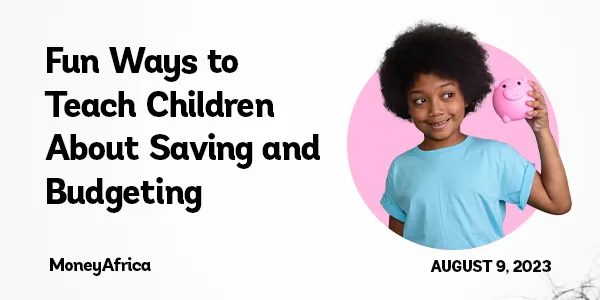Good Morning 😃
How are you doing?
Have you ever attempted to teach your children about money, only to realise it’s more challenging than expected? If so, you’re definitely not alone. In a recent conversation with a client, she shared her struggles in educating her children about money matters. Her 8-year-old believes she can have anything she desires whenever she wants. This perspective stems from the belief that if Mum drives a nice car and earns well, everything should be attainable.
She said, “While I can certainly afford these things, I recognise the importance of instilling values like delayed gratification, prudent money management, contentment, and the significance of saving and investing. Despite my efforts to simplify these concepts, I still find it challenging to impart these lessons effectively.”
Here are four tips I shared with her on how she can start teaching her children about money and how you teach yours, too.
- Use a piggy bank
Do you recall how you saved money as a child? Chances are, you stashed your money in a trusty piggy bank or “kolo.” Well, guess what? This method is still effective today. It’s an easy way to build excitement about saving. It also gives a kind of visual for your child, as he or she watches their money grow and pile up.
Before we delve into other points, have you enrolled your child in our ongoing Financial Boot camp? This programme is designed to instill financial intelligence in your child from a young age. The Boot camp caters to children aged 7 to 16. Secure a spot by signing up here or send a mail to kids@themoneyafrica.com.

- Host a saving contest
Who doesn’t like a friendly competition to motivate them to work towards the winning prize? Organising a family savings contest can be a fantastic method to inspire children to save money. Set a specific deadline and see who can save the most. Create opportunities for your child to earn money by completing tasks like chores, displaying good behaviour, or achieving good grades in school. Collaborate with your child to determine the prize for the winner, whether it’s extra cash, a coveted item, or a visit to their favourite park.
- Go to the bank or visit any financial institution
Embark on a special outing with your child to the bank and help them open a dedicated savings or child’s investment account. Many financial institutions provide youth savings accounts to foster early saving habits. During this visit, your child will witness firsthand how banks operate and the growth of their account balance. This excursion also serves as an ideal opportunity to introduce them to the advantages of compound interest, laying the foundation for their financial journey.
- Use money apps or games
Children are more tech-savvy than ever before. If tracking chores on a poster board with stars and smiley face stickers seem outdated, consider going digital. There are chores and allowance apps available for children who prefer to see their rewards on their electronic device and money games to learn the basic concepts of money.
It’s never too early or too late to teach children about saving and budgeting. The task doesn’t have to be as complicated as you might imagine. With creativity, time, effort, and consistency, you can make it fun and adventurous for your children to learn about money.
***
Would you like to know the state of your finances?
Take this test to see how you are doing financially
***
Do you know that we have our own podcast? It’s MONEYTALKS!💚
Here’s a link to listen to all the amazing episodes we have!
***
Thank you for reading Money Africa’s Blog.
Please feel free to share it.
MoneyAfrica premium plan
Are you a mid to high-income earner? Do you find communities a bit too busy? You should sign up for our premium plan.

You can learn more about that here.
***
We often get questions regarding how to plan your finances to align with your relocation plans, especially for students seeking to further their studies. As always, we have heard you, and we have put together an e-book to help you navigate this. Follow this link, to get your FREE copy of the e-book: The Japa Encyclopedia.
***
Get our annual subscription and learn more about investing safely and building a solid portfolio in 2023.
Don’t forget to:
- Join our community, if you want to smash your 2023 financial goals. It takes at least 30 days to build great habits that will last you a lifetime. So why not start now? There is a lot you can achieve.
- If you would like to document your financial journey in 2023, then our journal would be an excellent fit for you. It costs ₦7,500 (excluding delivery).
- Get a budget sheet to track your monthly expenses. Click here
- Get an investment tracker to be on top of all your investments. Click here
MoneyAfrica is a financial literacy platform. Our goal is to make everyone better with their finances.
We do this by engagements via our:
– social media handles
– platforms for paid community members (for adults and students)
– webinar sessions with corporate clients
Would you like to join any of the communities? Please click here
Would you like us to hold a webinar for your company’s staff? Please send an email to info@themoneyafrica.com


